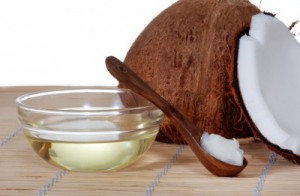![]()
This is a guest post from Nicole Gustavson – InForm Fitness, Leesburg, VA.
I recommend starting each day with a 20-gram shot of saturated fat. Then I suggest that you repeat that decadence at least one more time each day, preferably about 20 minutes before your lunchtime meal. Sound crazy?
No, or at least not by that measure. Many people swear by coconut oil’s health benefits – and I’m one of them! The regimen prescribed above would ensure a daily 2-3 tablespoons minimum intake of coconut oil. I would also use coconut oil to fry eggs, sauté vegetables, and lather your skin after a hot shower.
Why? The health benefits of coconut oil are almost too many to list, but here are just a few:
- maintain cholesterol levels
- increased immunity from disease and infection
- improved digestion and metabolism
- relief from kidney problems, heart disease, high blood pressure, diabetes, HIV and cancer
- augment dental and bone strength
- lend to better weight loss, hair care, skin care, and stress relief
So what about heart disease?
Coconut oil consists of roughly 90% saturated fat. This fact often condemns the oil as being bad for the heart, but that is a misconception. Coconut oil is actually beneficial for the heart because it contains about 50% lauric acid. Lauric acid is a unique fat, which helps prevent various heart problems, including high cholesterol levels and high blood pressure. The saturated fats present in coconut oil are not harmful like other man-made vegetables oils and do not increase bad cholesterol (LDL) levels. Moreover, the saturated fat in coconut oil reduces the incidence of injury in arteries and therefore helps in preventing the thickening of artery walls.
Mankind has been consuming mainly saturated fats – in the form of butter, lard, coconut oil, etc. – for thousands of years, yet heart disease was rare before the 1920s. If anything, the recent rise of heart disease is most likely owing to the increased use of poly-unsaturated vegetable oils such as corn, safflower and canola, as well as margarine. Uh, margarine – I just cringed.
The bottom line on heart disease and coconut oil is that all saturated fats are not created equal. The operative word here is ‘created’ because some saturated fats occur naturally, while other fats are artificially manipulated into a saturated state through the man-made process called hydrogenation. Hydrogenation manipulates vegetable and seed oils producing a rancid, thickened substance that only benefits foods’ shelf lives and corporate profits.
Weight loss, Digestion, Immunity and Infections
I suggested earlier to dosing on 1 1/2 tablespoons coconut oil about 20 minutes before mealtimes. The reason is simple – your appetite will be cut in half and you will be able to refrain from eating beyond satiety at the proceeding meal. But I’ve only just begun to share with you the benefits of this miracle oil.
The fat content of coconut oil is more easily converted into energy than other oils. Coconut oil is nature’s richest source of medium-chain fatty acids, also called medium-chain triglycerides (MCT). MCTs are easily digested and immediately burned by your liver for energy (like carbohydrates, but without the insulin spike) and actually boost your metabolism and help your body use fat for energy. MCT also help in healthy functioning of the thyroid and enzymes systems, and increases the body metabolism by removing stress on the pancreas, thereby burning more energy.
Coconut oil also helps control blood sugar, the secretion of insulin, and the body’s effective utilization of blood glucose. How does this contribute to weight loss? See our recent blog the “Exercise to Lose Weight Conundrum”.
Reducing the workload on the liver, preventing the accumulation of fat, and treating diabetes are still just the tip of the palm tree. MCTs not only bolster metabolism, endurance, and performance, but they also improve overall digestion, immune function, and healing.
Your body converts coconut oil’s lauric acid content into monolaurin, a compound claimed to be toxic to viruses, bacteria, funguses and other microorganisms that cause other diseases. Coconut oil thereby enhances immunity strength and fights against a variety of infections due to its antimicrobial, antioxidant, antifungal, antibacterial and soothing properties.
These properties prevent the various bacteria, fungi, parasites, etc., that cause indigestion, thus improving the digestive system, while aiding in the absorption of other nutrients such as vitamins, minerals and amino acids. Such important minerals include calcium and magnesium – essential for bone development. Everyone prone to osteoporosis after middle age should be paying close attention.
Use and Dosage
Just as with any dose-response relationship, appropriate individual prescriptions for introducing dietary coconut oil will differ. Some people report experiencing mild nausea, but quickly build up a tolerance.
If you are not quite ready to ingest coconut oil by the tablespoon, try substituting it for your butter or oil the next time you sauté your shrimp or roast your Jicama home fries. Coconut oil is ideal as a culinary oil because it can withstand high temperatures without losing its healthy properties and more importantly, it does not contain trans-fatty acids.
If you are worried about your food tasting like coconuts, I recommend Omega Nutrition’s Aroma-Free Certified Organic Coconut Oil for a mild, light, and subtle flavor.
And don’t forget to keep a jar in the bathroom, as the skin and hair care benefits continue to astound me.
![]()









